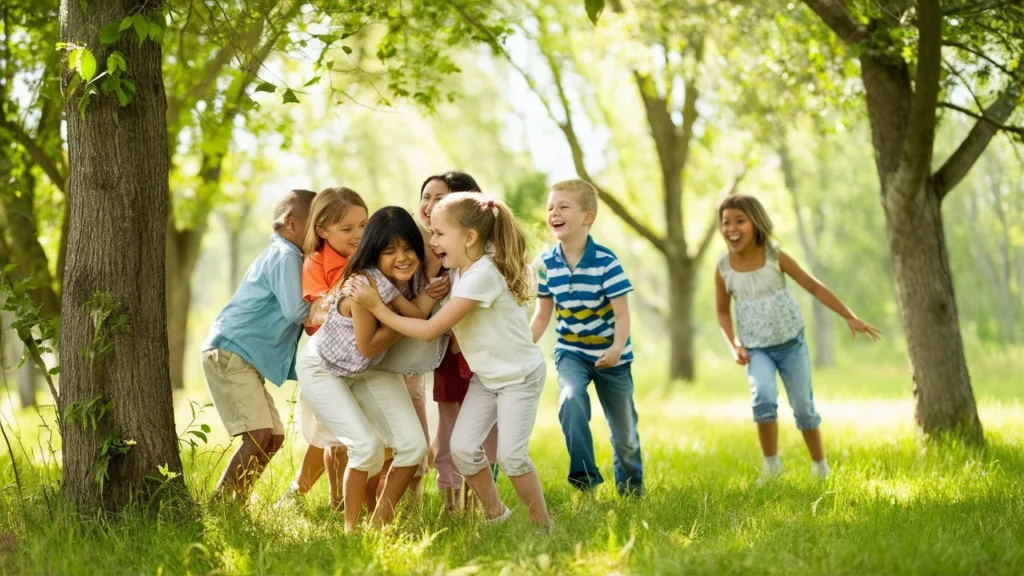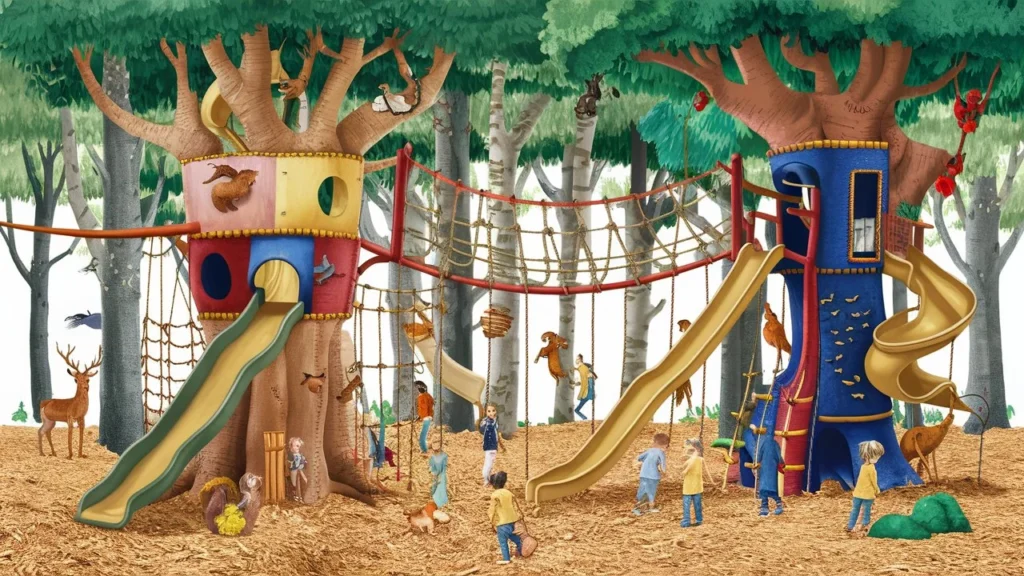The Role of Nature-Based Play in Cognitive Development
Table of Contents
In an increasingly urbanized and technology-driven world, children are spending less time outdoors than ever before. However, research indicates that nature-based play is not just a pleasant pastime but also plays a critical role in the cognitive development of children. This article will explore how outdoor play, particularly in natural settings, can boost cognitive functions such as attention, memory, creativity, and problem-solving skills. Drawing from cognitive research, we will highlight the importance of re-establishing children’s connection to nature and the substantial benefits it can offer.
What is Nature-Based Play?

Nature-based play refers to unstructured, child-directed play activities that occur in natural environments such as parks, forests, beaches, and gardens. This type of play involves interaction with elements of nature—trees, plants, water, rocks, and wildlife—and encourages free exploration and creativity. Unlike structured play in playgrounds, nature-based play allows children to engage with the environment in a less restricted way, fostering curiosity and discovery.
The Cognitive Benefits of Nature-Based Play
1. Attention Restoration
One of the most significant cognitive benefits of nature-based play is its ability to restore attention. According to Attention Restoration Theory (ART), natural environments help replenish the brain’s ability to focus and concentrate. When children play in natural surroundings, their minds are not bombarded with the constant stimuli that are common in urban or indoor environments. This restorative effect helps improve their ability to concentrate on tasks later.
Supporting Research
A landmark study conducted by Stephen Kaplan in 1995 showed that individuals who spent time in nature performed better on cognitive tasks requiring directed attention compared to those who did not. More recently, a 2019 study by University of Illinois researchers found that children who played in green spaces had better attention spans and reduced symptoms of attention-deficit/hyperactivity disorder (ADHD) compared to those who played in built environments.
| Study | Focus of Research | Key Findings |
|---|---|---|
| Kaplan (1995) | Attention Restoration Theory | Nature restores directed attention, improving focus |
| University of Illinois (2019) | ADHD and Nature | Playing in green spaces reduces ADHD symptoms and boosts attention |
2. Enhanced Creativity and Problem-Solving
Nature-based play fosters creativity by providing a blank slate for imaginative play. Without the restrictions of structured environments or pre-designed toys, children are free to invent their own games and solve problems in a natural setting. This open-ended play encourages children to think outside the box, developing critical thinking and problem-solving skills.
Supporting Research
A 2014 study by Massey University found that children who played in natural settings showed higher levels of creative thinking compared to those who played in man-made playgrounds. The children demonstrated more innovative use of objects, such as using sticks as pretend tools or building materials, which required higher-level problem-solving and improvisation.
| Creative Play Study | Focus | Result |
|---|---|---|
| Massey University (2014) | Nature-based vs. playground play | Higher creative thinking in natural play environments |
3. Improved Memory and Learning
Nature has also been shown to have a positive impact on memory. According to research published by the University of Michigan, nature walks significantly improved short-term memory performance in both children and adults. Exposure to natural environments promotes relaxation and reduces cognitive fatigue, which in turn allows the brain to better encode and retain information.
In educational contexts, integrating nature into learning environments has been shown to enhance learning outcomes. Schools that incorporate outdoor classes or nature-based activities report that students retain information better and are more engaged in lessons. This is particularly important in early childhood education, where hands-on learning and experiential play are crucial for cognitive development.
4. Boosting Executive Function
Executive function refers to a set of cognitive processes including working memory, flexible thinking, and self-control. These skills are essential for managing time, paying attention, and regulating behavior—abilities that are foundational for success in school and life.
A growing body of evidence suggests that nature-based play improves executive function. A 2016 study by the University of British Columbia demonstrated that children who regularly played in natural environments displayed better self-regulation and working memory than those who predominantly played indoors. The unstructured, challenging nature of outdoor play requires children to adapt to changing circumstances, fostering cognitive flexibility and strategic planning.
| Cognitive Process | Effect of Nature-Based Play |
|---|---|
| Working Memory | Improved memory retention and recall |
| Cognitive Flexibility | Enhanced ability to adapt to new challenges |
| Self-Regulation | Better emotional control and behavior management |
5. Social and Emotional Development
Though the focus of this article is on cognitive development, it’s worth noting that social and emotional growth is also supported through nature-based play. Natural environments encourage cooperative play, negotiation, and teamwork, all of which are tied to higher emotional intelligence and empathy—traits that have a direct correlation with cognitive health.
Barriers to Nature-Based Play

Despite the documented benefits, many children today lack access to natural environments for play. Urbanization, screen time, and busy family schedules are some of the barriers that limit children’s interaction with nature. Moreover, safety concerns and the increasing popularity of digital entertainment have shifted children’s activities indoors.
Statistics on Decline in Nature-Based Play
According to a report by the Children & Nature Network, American children spend an average of just 4-7 minutes a day in unstructured outdoor play, compared to over 7 hours a day in front of screens. This sharp decline in outdoor activity is worrying, as it deprives children of the cognitive benefits of nature.
| Time Spent Outdoors | Statistic |
|---|---|
| Daily Outdoor Play (Unstructured) | 4-7 minutes/day |
| Daily Screen Time | 7+ hours/day |
How to Reintroduce Nature-Based Play

To combat the decline in nature-based play, communities, schools, and parents can take active steps to encourage outdoor activities. Here are some practical ways to reintroduce nature into children’s daily lives:
1. Outdoor Classrooms
Schools can incorporate outdoor classrooms or learning gardens, where children can learn about science, math, and art through hands-on interaction with natural elements. Schools that integrate outdoor learning have reported better engagement and improved cognitive outcomes in students.
2. Nature Clubs and Groups
Parents can form nature clubs where families meet regularly in local parks or nature reserves. This provides a structured way for children to explore the outdoors while socializing with peers.
3. Reduce Screen Time
Limiting screen time allows children more opportunities for physical and imaginative play outdoors. Parents can set daily screen limits and encourage their children to engage in nature-based activities like hiking, gardening, or simply exploring the backyard.
Frequently Asked Questions (FAQ)
Q: How much time should children spend playing outdoors to see cognitive benefits?
A: Studies suggest that children benefit from at least 30 minutes to an hour of outdoor play daily. Longer periods in nature have shown even more significant cognitive improvements, especially in attention and problem-solving skills.
Q: Are urban environments detrimental to cognitive development?
A: While urban environments offer various learning opportunities, research shows that exposure to natural settings provides unique cognitive benefits. Urban noise and overstimulation can contribute to cognitive fatigue, which is why regular time in nature is essential.
Q: What age group benefits most from nature-based play?
A: Nature-based play is beneficial for all age groups, but early childhood (ages 2-7) is a critical period for brain development. Children in this age range gain the most from the sensory-rich experiences that nature provides.
Q: Can nature-based play help children with ADHD?
A: Yes, studies have shown that children with ADHD experience fewer symptoms and improved concentration when they engage in regular outdoor play, especially in green spaces.
Conclusion
Nature-based play is not just a nostalgic throwback to simpler times; it is a crucial component of healthy cognitive development. Research overwhelmingly supports the idea that time spent in natural environments enhances attention, memory, creativity, and executive function. With increasing urbanization and the proliferation of digital entertainment, it is more important than ever to prioritize outdoor play in children’s lives. By reintroducing nature-based activities, we can foster the cognitive and emotional growth that will benefit children throughout their lives.
References
- Kaplan, S. (1995). The Restorative Benefits of Nature: Toward an Integrative Framework. Journal of Environmental Psychology.
- University of Illinois (2019). Nature and Attention-Deficit/Hyperactivity Disorder (ADHD): A Study of Children’s Play.
- Massey University (2014). Creative Thinking and Problem-Solving in Natural Play Environments.
- University of Michigan (2008). The Cognitive Benefits of Nature Walks: Enhancing Memory and Learning.
- University of British Columbia (2016). Nature-Based Play and Executive Function: A Longitudinal Study







